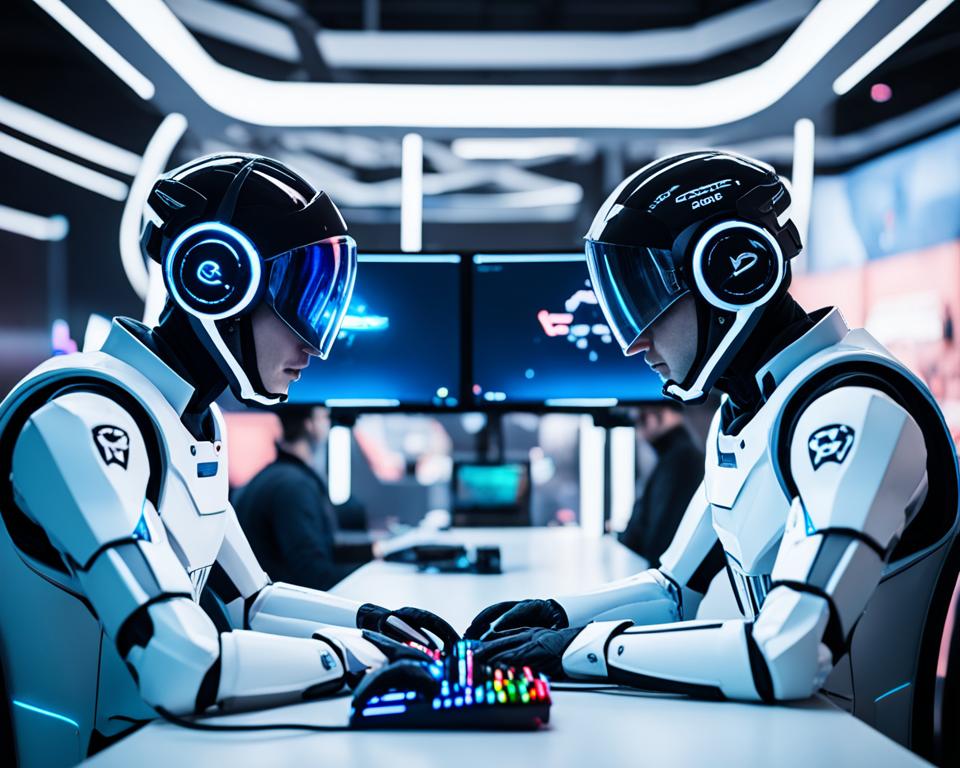Hello, gamers! Today, I want to talk about an exciting development that is poised to revolutionize the gaming industry and shape the future of gaming as we know it. I’m talking about the integration of AI companions in gaming.
Artificial Intelligence (AI) has been making significant strides in recent years, and its impact on the gaming industry is becoming increasingly evident. With the rise of gaming industry trends and emerging gaming technologies, AI companions are transforming the way we play, enhancing our gaming experiences, and taking interactive entertainment to new heights.
In this article, we will explore the various aspects of AI companions in gaming. We’ll discuss how AI elevates player experience, the shift from static non-player characters (NPCs) to dynamic AI-driven characters, the use of AI for crafting immersive narratives and realistic graphics, the emotional intelligence of AI companions, the influence of AI on market dynamics, collaborative gameplay with AI companions, and the rise of AI in esports. By the end, we’ll have a clearer understanding of the potential that AI holds for the future of the gaming industry.
So, whether you are a casual gamer, an esports enthusiast, or someone interested in the latest gaming developments, join me as we delve into the exciting world of AI companions in gaming.
Key Takeaways:
- Gaming industry trends and emerging gaming technologies are driving the integration of AI companions in gaming.
- AI companions enhance player experience by providing interactive and dynamic interactions.
- Non-player characters (NPCs) are evolving from static bystanders to dynamic AI-driven characters.
- AI is revolutionizing game narratives by crafting immersive and personalized stories.
- AI integration improves game graphics and environment simulation, creating realistic and immersive gaming experiences.
The Revolutionary Impact of AI on the Gaming Industry
AI has the potential to revolutionize the gaming industry by automating various aspects of the creative process. From asset generation and world building to game performance optimization and playtesting, AI-driven technologies are reshaping the way games are developed and experienced.
Automating the Creative Process: Asset Generation and World Building
AI-based asset generation and world building are revolutionizing game development. By utilizing AI algorithms, game developers can automate the process of creating game assets such as characters, environments, and objects, saving significant time and effort. AI can generate intricate and realistic designs, textures, and animations, resulting in visually stunning and immersive game worlds. This automation allows developers to focus more on other aspects of game creation, such as gameplay mechanics and storytelling, leading to enhanced game experiences for players.
Optimizing Game Performance Through Data Analysis
AI can optimize game performance by leveraging data analysis techniques. Through sophisticated algorithms, AI can analyze player behavior, hardware specifications, and network conditions to identify performance bottlenecks and improve gameplay experiences. By identifying areas of improvement, developers can enhance loading times, reduce lag, and optimize frame rates, resulting in smoother and more enjoyable gameplay. Furthermore, AI-powered data analysis enables developers to make informed decisions regarding system requirements, ensuring that games can be played seamlessly across a range of devices and platforms.
AI-Driven Playtesting: A New Era of Game Development Efficiency
AI-driven playtesting is revolutionizing the game development process. Traditional playtesting methods rely on human testers, which can be time-consuming and subjective. AI-powered playtesting, on the other hand, can simulate human behavior and provide comprehensive insights into game balance, difficulty levels, and overall player experience. By analyzing vast amounts of data and running simulations, AI can identify bugs, glitches, and balancing issues that may have gone unnoticed during traditional playtesting. This advanced form of playtesting allows developers to iterate and refine their games efficiently, resulting in more polished and enjoyable experiences for players.
To showcase the impact of AI on the gaming industry, let’s take a closer look at a specific example: AI-based asset generation and world building. With the use of AI algorithms, game developers can automate the process of creating game assets such as characters, environments, and objects. This streamlines the development process, saving time and effort while maintaining high-quality visuals and immersive game worlds.
AI automation allows for the generation of intricate and realistic designs, textures, and animations, resulting in visually stunning and lifelike game environments. This advanced technology empowers developers to focus on other aspects of game creation, such as gameplay mechanics, storytelling, and player interactions. By leveraging AI-driven asset generation and world building, game developers can unlock new levels of efficiency and creativity, pushing the boundaries of what is possible in the gaming industry.
How AI Companions Elevate Player Experience
AI companions have greatly enhanced the player’s gaming experience by providing interactive and dynamic interactions. Unlike static non-player characters (NPCs), AI companions adapt to player behavior, offering personalized journeys that create a more engaging and immersive gaming environment. These AI-driven companions add emotional depth and authenticity to the gameplay, enhancing the player’s sense of immersion and connection with the virtual world.
Through AI-driven gaming interactions, players can engage with their AI companions in a more natural and responsive manner. These companions can understand player inputs, preferences, and play styles, allowing for unique and tailored experiences. This adaptability makes AI companions more than just scripted characters, but rather, partners that evolve and grow alongside the player throughout their gaming journey.
Furthermore, the presence of AI companions in games enhances player immersion by creating a sense of companionship and collaboration. Whether it’s embarking on epic quests together or strategizing for victory, the AI companions provide a sense of teamwork and camaraderie that elevates the overall gaming experience.
With their ability to adapt, personalize, and provide emotional depth, AI companions have become a vital component in modern gaming. As technology continues to advance, we can expect even more sophisticated AI-driven interactions and companionship in games, further enhancing player immersion and creating unforgettable gaming experiences.

The Shift from Static NPCs to Dynamic AI-Driven Characters
Non-player characters (NPCs) in video games are evolving from static bystanders to dynamic AI-driven characters. Gone are the days when NPCs merely served as props or quest-givers.
From Simple Bystanders to Complex Beings: The Evolution of NPCs
The evolution of NPCs has been a remarkable journey, with developers constantly pushing the boundaries of AI technology. What was once a simple script-driven behavior has transformed into complex beings with their own emotions, personalities, and evolving relationships with players.
Dynamic AI characters in gaming now possess the capability to adapt and react to player actions, creating a more immersive and engaging experience. NPCs can learn, grow, and evolve alongside players, offering a sense of realism and authenticity that was previously unattainable.
This evolution has not only enhanced the overall narrative and gameplay but has also expanded the possibilities for player interaction and decision-making. AI-driven NPC evolution allows for customized experiences and unique storylines, ensuring that each player’s journey is truly their own.
The Role of Large Language Models in Creating Conversational NPCs
Conversational NPCs are another significant development in the world of gaming. With the help of large language models, developers can create NPCs that engage in interactive and realistic conversations with players.
This technology enables NPCs to understand context, decipher player intent, and respond intelligently. Conversations with NPCs can range from simple exchanges of information to deep, meaningful dialogues that contribute to character development and plot progression.
Large language models in gaming provide a foundation for rich and dynamic dialogues, making the interactions between players and NPCs feel more natural and immersive. This level of conversational AI sets the stage for new gameplay experiences and opens up exciting possibilities for storytelling and character-driven narratives.
| Static NPCs | A Dynamic AI-Driven Characters |
|---|---|
| Follow pre-defined scripts | Adapt and react to player actions |
| Limited dialogue options | Engage in interactive and realistic conversations |
| Fixed personality traits | Evolving emotions and relationships with players |
| Static behaviors and routines | Learn, grow, and evolve alongside players |
The table above showcases the significant contrasts between static NPCs and dynamic AI-driven characters, highlighting the evolution in AI technology and its impact on gaming.
The shift from static NPCs to dynamic AI-driven characters represents a fundamental change in the way players interact with virtual worlds. The future of gaming holds incredible potential for even more realistic and immersive experiences, thanks to the continued evolution of non-player characters and the integration of advanced AI technologies.
Crafting Immersive Narratives with AI
AI has revolutionized the way narratives are crafted in gaming, allowing for the creation of immersive and dynamic stories that captivate players. With AI in narrative design and AI-generated storytelling, game developers can generate unique and personalized storylines, providing infinite possibilities for player engagement.
The use of AI-powered story branching further enhances the immersive nature of game narratives. Through AI’s ability to adapt and evolve based on player choices and behavior, game narratives become more personalized, creating a truly engaging storytelling experience that keeps players invested.
AI also plays a significant role in game writing, enabling the creation of rich and compelling narratives that seamlessly integrate into the gameplay experience. AI-powered game writing tools assist game developers in generating dialogue, character interactions, and narrative arcs, ensuring a cohesive and immersive storytelling experience for players.
“The integration of AI in narrative design and game writing allows for the creation of immersive game narratives that offer unique experiences for each player.” – Game Development Magazine
By leveraging AI in game writing and narrative design, developers can focus on crafting intricate and emotionally resonant narratives while AI assists in generating content that enhances the overall player experience.

Integrating AI for Realistic Graphics and Environment Simulation
The integration of AI technology in gaming has significantly enhanced the realism of game graphics and environmental simulations. With the power of AI, game developers can create visually stunning and immersive game worlds that blur the lines between the virtual and the real.
Nvidia’s GauGAN: Blurring the Lines Between Game and Reality
One example of AI technology that is revolutionizing realistic graphics is Nvidia’s GauGAN. This AI-powered tool uses deep learning algorithms to transform simple sketches into near-photorealistic landscapes. By analyzing the strokes and composition of an artist’s rough sketch, GauGAN can generate highly detailed and visually appealing environments with stunning realism.
With GauGAN, game developers can save time and effort by automating the process of creating intricate game environments. This technology offers a new level of efficiency and creativity, allowing developers to focus on other critical aspects of game design and storytelling.
AI-Enabled Weather and Environmental Interaction for Enhanced Realism
In addition to realistic graphics, AI also enables weather and environmental interactions that enhance game realism. AI algorithms can simulate dynamic weather patterns and environmental changes, such as rain, fog, and day-night cycles, adding depth and immersion to the gaming experience.
By incorporating AI-enabled weather and environmental interactions, game developers can create more realistic and responsive game worlds. Players can witness the impact of weather conditions on gameplay and experience a more immersive and authentic gaming environment.
Overall, the integration of AI in game design brings enhanced realism to graphics and environment simulation. Technologies like Nvidia’s GauGAN and AI-enabled weather interactions elevate the gaming experience, pushing the boundaries of what is possible in virtual worlds.
Emotional Intelligence: AI Companions That Understand and React
One of the fascinating aspects of AI companions in gaming is their ability to possess emotional intelligence, allowing them to understand and react to player emotions. These AI companions are more than just scripted characters; they can provide empathetic responses, comprehend player preferences, and adjust their behavior accordingly. This emotional intelligence not only enhances the player’s connection with the AI companion but also adds depth and authenticity to the gaming experience.
AI-driven emotional responses in gaming are made possible through advanced algorithms and machine learning techniques. These technologies enable AI companions to interpret and analyze player emotions, such as joy, frustration, or surprise, based on various cues and interactions within the game environment. By understanding the emotional state of the player, AI companions can adapt their responses to provide appropriate support, companionship, or challenge.
Imagine playing a role-playing game where your AI companion recognizes your frustration during a difficult boss battle and offers words of encouragement to boost your morale. Or imagine exploring a vast open world where your AI companion acknowledges your awe and wonder, adding comments that enhance your sense of immersion. These examples illustrate how AI companions with empathy can enhance the overall gaming experience and create a more dynamic and immersive virtual world.
Furthermore, AI companions that understand player emotions can also improve the personalization of the gaming experience. By analyzing player behavior and emotional responses, AI companions can adapt their behavior and dialogue to create a unique and tailored experience for each player. This level of customization allows players to feel more connected to the game world and characters, enhancing their overall engagement and satisfaction.
The integration of emotional intelligence in AI companions is a significant step forward in creating more realistic and engaging gaming experiences. As AI technology continues to evolve, so does the potential for AI companions to provide even more nuanced and sophisticated emotional responses. The future of gaming holds great possibilities for further advancements in AI emotional intelligence, ultimately leading to more immersive, personalized, and emotionally impactful gaming experiences.

Gaming Industry Trends: AI’s Influence on Market Dynamics
As AI continues to advance, its impact on the gaming industry becomes increasingly evident. The integration of AI technology is shaping market dynamics and driving growth within the gaming industry. The seamless integration of AI-powered features and capabilities into games is revolutionizing player experiences and expanding the potential for market growth.
Potential for Market Growth with AI Integration
The integration of AI in the gaming market has the potential to fuel exponential growth. By leveraging AI’s ability to enhance player experiences, game developers can attract and retain a larger audience. AI-driven technologies, such as intelligent NPCs, personalized narratives, and dynamic gameplay, create immersive and engaging gaming experiences that captivate players for longer periods.
Furthermore, AI integration enables game developers to tap into emerging gaming markets and demographic segments. The ability to adapt games to specific player preferences and cultural nuances allows for localization and increased market penetration. This flexibility and customization lead to broader market reach and ultimately drive market growth.
Investment and Innovation: AI’s Impact on Gaming Companies’ Valuation
The integration of AI technology in the gaming industry has sparked significant investment and innovation. Gaming companies recognize the potential of AI to revolutionize player experiences and capture market share. This recognition has translated into substantial investments in AI research, development, and implementation.
As gaming companies embrace AI, their valuation and market positioning have changed. Investors and stakeholders see the potential for increased revenue and profitability through AI-driven advancements. AI-powered games and related technologies are becoming key differentiators and competitive advantages in the market, leading to higher valuations of gaming companies.
The image above exemplifies the dynamism of the gaming industry with integrated AI technologies. The ongoing AI-driven market growth highlights the transformative power of AI in revolutionizing the gaming landscape.
Collaborative Gameplay: AI Companions as Team Players
In the world of gaming, collaboration and teamwork are essential for success. With the integration of AI companions, players now have the opportunity to enhance their collaborative gaming experience. These AI companions are not just passive entities but actively contribute to strategy and problem-solving, making them valuable team players.
AI Partners in Strategy and Problem-Solving
AI companions bring a new level of strategic thinking to collaborative gameplay. Their advanced algorithms and computational power enable them to analyze vast amounts of data and provide valuable insights for making strategic decisions. Whether it’s devising the best attack plan or formulating a defense strategy, AI companions can lend their expertise to enhance team performance.
Moreover, AI-driven problem-solving is another key aspect of collaborative gameplay. AI companions can assist players in solving complex puzzles, deciphering clues, and overcoming challenging obstacles. By leveraging their problem-solving capabilities, AI companions offer valuable support and contribute to the overall success of the team.
Machine Learning for Adaptive Ally Behavior
One of the remarkable features of AI companions is their ability to adapt their behavior based on machine learning algorithms. Through continuous learning and analysis of player behavior, AI companions can tailor their actions to complement the strengths and weaknesses of their human teammates. This adaptive ally behavior ensures a cohesive and efficient team dynamic.
Additionally, machine learning enables AI companions to improve over time and learn from their experiences. They can observe player strategies, study successful moves, and develop innovative approaches to gameplay. This adaptability, combined with their problem-solving capabilities, makes AI companions invaluable assets in collaborative gaming.

The integration of AI companions as team players in collaborative gameplay has revolutionized the way players strategize, problem-solve, and interact within the gaming world. With their advanced algorithms and adaptive behavior, AI companions offer valuable support, enhance gameplay experiences, and promote efficient teamwork. The future of collaborative gaming is undoubtedly brighter with the inclusion of AI companions as indispensable allies.
AI in Esports: Reshaping Competitive Gaming
AI is reshaping competitive gaming and the esports industry. The integration of AI technology has had a profound impact on various aspects of esports, revolutionizing performance analysis, training methods, and overall gameplay optimization.
One of the key areas where AI has made a significant impact is in performance analysis. AI algorithms can analyze vast amounts of data, providing valuable insights into players’ strengths, weaknesses, and potential improvements. This AI-driven analysis helps esports teams and players identify areas for growth and strategically enhance their gameplay strategies.
AI is also assisting in training processes, offering personalized and adaptive training programs to players. Through machine learning algorithms, AI can assess players’ skills, create customized training regimens, and provide real-time feedback to help players refine their techniques and enhance their gameplay performance.
Moreover, AI is utilized during esports competitions for analysis and decision-making. AI-powered algorithms can analyze gameplay patterns, predict opponents’ moves, offer strategic recommendations, and optimize in-game actions. This level of AI-assisted decision-making enhances the competitive landscape and elevates players’ capabilities, ensuring that every move counts towards victory.
With AI-driven esports performance analysis, AI-assisted training programs, and AI algorithms actively contributing to gameplay optimization, the esports industry is experiencing a transformative shift. AI integration in esports has the potential to shape the future of competitive gaming, enhancing player capabilities, and pushing the boundaries of what is possible in the world of esports.
In the next section, we will explore the conclusion of this article, summarizing the potential of AI in gaming and its impact on player experience.
Conclusion
In summary, the integration of AI companions in gaming has the potential to radically transform the industry and elevate player experiences. AI’s impact extends across multiple facets of gaming, including creative processes, graphics, narratives, market dynamics, and collaborative gameplay. The future of gaming with AI companions offers a wealth of possibilities for innovation, immersion, and personalized gaming experiences.
By automating asset generation and world building, AI enhances game development efficiency and allows for the creation of expansive and intricate environments. AI-driven data analysis optimizes game performance, resulting in smoother gameplay and shorter loading times. Additionally, AI-enabled playtesting simulates human behavior, providing valuable insights for refining games.
AI companions elevate player experience by offering dynamic and interactive interactions, enhancing immersion and engagement. The shift from static NPCs to dynamic AI-driven characters introduces emotions, personalities, and evolving relationships, creating more realistic and engaging gaming experiences. Through AI, game narratives become immersive and adaptable, offering personalized storylines and branching paths.
The integration of AI also facilitates realistic graphics and environment simulation. Technologies like Nvidia’s GauGAN blur the lines between the virtual game world and reality, creating near-photorealistic environments. AI also enables weather and environmental interactions, enhancing game realism and immersiveness.
Furthermore, AI companions equipped with emotional intelligence understand and react to player emotions, providing authentic and empathetic responses. AI’s influence on market dynamics drives growth and innovation in the gaming industry, leading to changes in market trends and consumer behavior. Lastly, AI companions in collaborative gameplay enhance strategy and problem-solving, promoting efficient teamwork and elevating the overall gaming experience.
With AI reshaping competitive gaming and the esports industry, AI-driven performance analysis and assistance revolutionize esports competitions and player capabilities. In conclusion, the seamless integration of AI companions in gaming holds great promise for the future of the industry, presenting opportunities for continued advancements, enhanced player experiences, and a new era of interactive entertainment.
